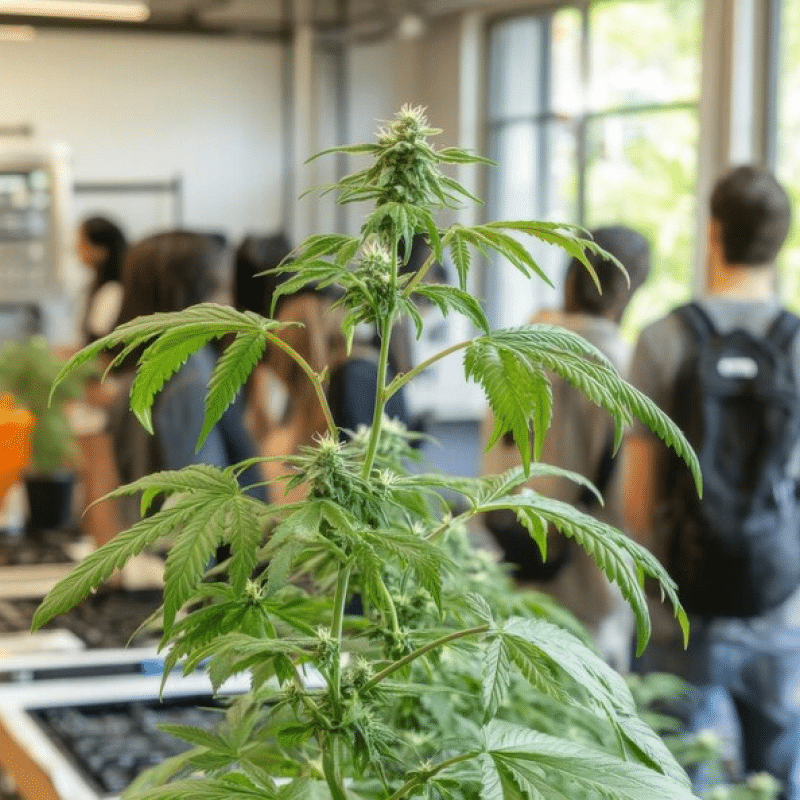From Stigma to Success: A Guide for Navigating Social Challenges in the Cannabis Industry
This guide provides insights into overcoming social challenges faced by businesses in the cannabis industry. It addresses the lingering stigma surrounding cannabis use and offers strategies for entrepreneurs to engage with their communities effectively. By understanding public perceptions and advocating for responsible practices, cannabis companies can work towards acceptance and success in a complex social landscape.

Building a successful business in the cannabis industry takes a lot: a lot of time, money, effort, and work goes into creating a business that is legally compliant, profitable, and growing. From the initial license process and fees to the brick-and-mortar building with inventory, entrepreneurs in the cannabis industry know what it means to work hard. But unfortunately, none of those factors ensure that you’ll be met with acceptance from the community when you finally open. Oftentimes, it can be just the opposite.
Understanding Lingering Stigma
Despite the fact that over half of Americans live where cannabis is legal in some form, the plant has still not shaken the lingering social stigma from the War on Drugs and “just say no” campaigns. Many people, particularly older generations in conservative areas, still see cannabis as the “devil’s lettuce” and a “gateway drug” to harder, more destructive substances.
Every community has people with this mindset, but some are more vocal than others. If people in your community have this belief around cannabis and are involved in local politics, you may face pushback or anger from people who don’t want cannabis in their community.
How can you help change their minds against these cannabis challenges?
Areas of Critique
First, don’t outright dismiss their concerns. Nothing makes people dig in their heels more than the feeling that they’re not being taken seriously. Like it or not, there are some valid concerns and critiques of this industry.
- Potential for abuse. While research suggests that cannabis has a lower potential for dependence than many other substances, some still worry about cannabis use disorder and increased consumption. You can point to studies that examine the potential for substance abuse like this study from 2021 that found the lifetime risk of dependence on cannabis “was lower than the risks for tobacco (32%), heroin (23%), cocaine (17%) and alcohol (15%.)”
- Impact on youth. Many critics fear that increased normalization of cannabis will increase youth consumption, and there are valid concerns about the impact of THC on developing brains. Point to research that shows legal cannabis can actually reduce teen consumption, like in Colorado where youth consumption is down 7% from 2013 (perhaps it just isn’t cool when adults do it too?)
- Marketing practices. State agencies and individuals alike have raised concerns over marketing tactics that target young people and minimize the potential risks of cannabis use. Given the potential negative impact of THC on developing brains, this concern should be taken seriously.
- Environmental impact. Large-scale cannabis production has a massive carbon footprint and environmental impact, particularly with increases in energy and water usage. If your business is taking steps to reduce this impact or create more sustainability in the cannabis industry, share that.
- Social justice. While the legal cannabis industry flourishes, there are still thousands of people locked up on non-violent cannabis charges. There are also valid concerns about the lack of diversity in the cannabis industry, and ensuring the communities who were disproportionately impacted by the War on Drugs receive their fair share of the profits.
Positive Developments
Being armed with knowledge and patience is the best way to have conversations about cannabis stigma and people’s misconceptions about the plant. If assuaging their concerns isn’t enough, you can also point to some of the positive developments that the cannabis industry has had.
- Focus on responsible use. Many cannabis companies promote responsible cannabis consumption in low doses and take care to educate their clients on the dosage, timing, and potency of cannabis products to help consumers develop supportive cannabis routines.
- Sustainability. Companies across the cannabis industry are taking steps to address the carbon footprint of the industry, using compostable packaging, growing flower outside without pesticides, eliminating single-use plastic, and obtaining certifications like B-Corp to highlight their commitment to sustainability.
- Social equity. Many states implemented expungement clauses in their legalization bills, and local and national organizations are helping people with cannabis charges wipe their records clean and get out of jail.
Despite the naysayers, public opinion on cannabis is changing. There is a growing acceptance of the plant across all demographics as people begin to understand exactly how much their plant can help them feel good.
Tips for Cannabis Companies to Overcome Social Stigma
You won’t be able to wipe out the social stigma against cannabis in your community overnight. But you can take actionable steps to help your business establish a solid foundation and a reputation for community engagement. Here are a few ideas to get you started:
- Community engagement. How can you be active in your community? Partner with local charities, participate in local events, and champion local causes to integrate with your community.
- Education. Most people don’t really understand the cannabis plant, and as a cannabis business, they’re looking to you for guidance. Provide scientifically accurate information about the plant and its benefits. You can create printed materials, have an online education section, or host cannabis FAQ classes.
- Be responsible. No matter what sector of the cannabis industry you’re in, keep a strict adherence to quality and safety standards, putting consumer safety first above everything else.
- Support research. For years the cannabis plant was demonized based on misinformation. Invest in research and development where you can to help the scientific community further understand cannabis and its benefits.
- Highlight success stories. People trust other people more than brands. Share stores of people in your community who have been positively impacted by cannabis.
- Address concerns. Don’t shy away from the hard conversations. Be open to community feedback and address concerns about cannabis or your business head-on.
- Partner with influencers. Collaborating with cannabis advocates and influencers in your community helps spread positive messages about the plant.
- Get involved politically. Involve yourself in local and state politics to advocate for policies that support the positive legalization and regulation of the cannabis plant.
There’s a lot that goes into building a successful business in the cannabis space. From investment and licensing to navigating community concerns and ensuring your business is fully protected, you have a lot to juggle. But you don’t have to do it alone.
Protecting your cannabis company can seem confusing; however, we’re a full-service insurance brokerage working with carriers worldwide to offer you the best coverage possible. We’re here to help! Please reach out to us today by email info@alpharoot.com or calling 646-854-1093 for a customized letter or learning more about your cannabis insurance options.




